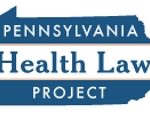Pennsylvania Health Law Project Releases Monthly Newsletter
The Pennsylvania Health Law Project has published the July edition of Health Law News, its monthly newsletter.
 Included in this edition are articles about the continued expansion of Pennsylvania’s Medicaid program; the next steps in Pennsylvania’s managed long-term services and supports (MLTSS) initiative; the state’s selection of its benchmark essential health benefits insurance plan for 2017; and about how the state will phase out its current AIDS waiver while continuing to serve those covered by the waiver.
Included in this edition are articles about the continued expansion of Pennsylvania’s Medicaid program; the next steps in Pennsylvania’s managed long-term services and supports (MLTSS) initiative; the state’s selection of its benchmark essential health benefits insurance plan for 2017; and about how the state will phase out its current AIDS waiver while continuing to serve those covered by the waiver.
Find the latest edition of Health Law News here.






